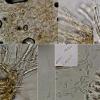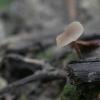
28-02-2026 14:43
A new refrence desired :Svanidze, T.V. (1984) Novy

01-03-2026 18:02
 Francois Guay
Francois Guay
I found this mystery Helotiales on an incubated le

01-03-2026 14:10
 Antonio Couceiro
Antonio Couceiro
Hola, me gustaria conocer opiniones sobre este tem

01-03-2026 18:46
 Robin Isaksson
Robin Isaksson
Hi! This species i se from time to time in the

01-03-2026 08:55
 Michel Hairaud
Michel Hairaud
Bonjour , Je souhaiterais recevoir cet article :�

01-03-2026 15:31
 Csaba Németh
Csaba Németh
Hello!I found these apothecia on Homalothecium lue

01-03-2026 17:51
 Bruno Coué
Bruno Coué
Bonjour,sur vieilles crottes de sanglier en chambr
Sclerotiniaceae on the wood
Mlcoch Patrik,
23-08-2021 22:13
 Please about help with determination.
Please about help with determination. On the part of wood of Alnus or Quercus, from the Czech Republic in july.
Apothecia cca to 5 mm in diam., sclerotium not see. Excipulum consist of cells of textura globulosa, cells 13-20 x 11-14(18) um, paraphyses 75 x 1,7 um, asci IKI + (BB), 60-80 x 5,4-6 um, ascospores (8)9-10(11) x (2,8)2,9-3,5(3,6) um, Q=3, N=20. I was looking for it between Ciborinia / Botryotinia etc., but it will maybe something else.
Thanks.
Hans-Otto Baral,
23-08-2021 22:58

Re : Sclerotiniaceae on the wood
I think a Moellerodiscus. In dead state not easy to give a name. Your asci and paraphyses are dead. The latter probably contain VBs when alive, the former are much larger when turgescent.
Mlcoch Patrik,
24-08-2021 11:50

Re : Sclerotiniaceae on the wood
Thanks, very interesting ... I have a question, when species are possible in central Europe on this substrate from this genus?
Hans-Otto Baral,
24-08-2021 12:27

Re : Sclerotiniaceae on the wood
Do you mean where they can occur, or at which time of the year? I know Moellerodiscus more in warmer or milder regions of Europe (e.g. atlantic), but my Moellerodiscus sp. HB 2938 on Alnus leaves and fruits made in summer 1985 is temperate (from Stuttgart), as is M. tenuistipes on Filipendula.
Mlcoch Patrik,
24-08-2021 13:13

Re : Sclerotiniaceae on the wood
Ou, sorry, typing error, I have mean which species, no "when" ... if it was good for anything, I can try to sequencing it.
Hans-Otto Baral,
24-08-2021 13:38

Re : Sclerotiniaceae on the wood
If you wantz to sequence it you should try to clarify some more characters, especially the iodine reaction under oil immersion and the presence of croziers. That would help in a conclusion, because the molecular knowledge is still poor.

